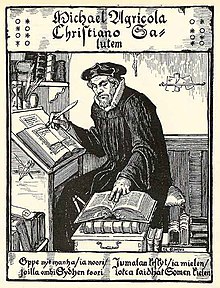
Back أدب فنلندا Arabic Literatura finesa Catalan Finská literatura Czech Llenyddiaeth Ffinneg CY Finsk litteratur Danish Finnische Literatur German Literatura finesa Spanish Soome kirjandus ET Finlandierazko literatura EU ادبیات فنلاندی FA
This article needs additional citations for verification. (July 2012) |
| Part of a series on the |
| Culture of Finland |
|---|
 |
| People |
| Languages |
| Mythology and folklore |
| Cuisine |
| Festivals |
| Religion |
| Literature |
| Music |
| Reformation-era literature |
|---|

Finnish literature refers to literature written in Finland. During the European early Middle Ages, the earliest text in a Finnic language is the unique thirteenth-century Birch bark letter no. 292 from Novgorod. The text was written in Cyrillic and represented a dialect of Finnic language spoken in Russian Olonets region. The earliest texts in Finland were written in Swedish or Latin during the Finnish Middle Age (c. 1200–1523). Finnish-language literature slowly developed from the sixteenth century onwards, after written Finnish was established by the bishop and Finnish Lutheran reformer Mikael Agricola (1510–1557). He translated the New Testament into Finnish in 1548.
After becoming a part of the Russian Empire in the early nineteenth century the rise in education and nationalism promoted public interest in folklore in Finland and resulted in an increase of literary activity in Finnish. Most of the significant works of the era, written in Swedish or increasingly in Finnish, revolved around achieving or maintaining a strong Finnish identity (see Karelianism). Thousands of folk poems in what came to be called Kalevala meter were collected in Suomen kansan vanhat runot (The ancient poems of the Finnish people). The most famous poetry collection is the Kalevala, published in 1835. The first novel published in Finnish was Seven Brothers (1870) by Aleksis Kivi (1834–1872). The book Meek Heritage (1919) by Frans Eemil Sillanpää (1888–1964) made him the first Finnish Nobel Prize winner. Another notable author is Väinö Linna.
Other works known worldwide include Michael the Finn and The Sultan's Renegade (known in the USA as The Adventurer and The Wanderer, respectively) by Mika Waltari (1908–1979). Beginning with Paavo Haavikko and Eeva-Liisa Manner, Finnish poetry in the 1950s adapted the tone and approach of T. S. Eliot and Ezra Pound. The most famous poet was Eino Leino. Timo K. Mukka (1944–1973) was the wild son of Finnish literature. Prominent writers of the twenty-first century include Mikko Rimminen and science fiction authors Leena Krohn (Finlandia Prize 1992) and Johanna Sinisalo (Finlandia Prize 2000).